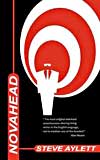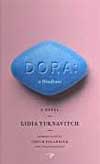 77
77
Novahead by Steve Aylett
Dora: A Headcase by Lidia Yuknavitch
 Novahead
Novahead
by Steve Aylett
Scar Garden, 2011
If you’ve never read Steve Aylett’s Beerlight novels (Novahead marks the last), think of the wisecracking, hard-drinking gumshoe Philip Marlowe, and throw him into an alternative future universe apparently infused with a psychedelic compound of some sort, and you get protagonist Taffy Atom. I know, it takes imagination to get there, but that’s one thing Aylett doesn’t lack. Marlowe’s L.A. is Atom’s Beerlight City (“If your heart stops in Beerlight they steal the wheels off it.”), and Marlowe’s choice of poison, Kentucky bourbon, is Atom’s Jade, an injectable drug that “people took to either raise or lower their intelligence to a median level [as] communication is almost impossible otherwise.”
Atom has been gone 10 years from Beerlight, residing outside the earthly bounds of the city and surrounding Fadlands. He hits the Delayed Reaction Bar where “you could hear the muted death of braincells like popping candy.” Except for barman Don Toto, who fills him in a bit: Betty is now running the mob since Cortez the Killer “went mad and ate his own ass.” So Betty’s Fort is one stronghold. Chief Blince, rarely without his bullhorn, is still sheriff, maintaining “seniority by sheer biomass.” And then there are Junco and the Mexicans, one of whom first came to Beerlight “on a sniper exchange program”; Brute Parker, the gunsmith and hitman, who will later arm Atom with the weapon of all weapons, the Hand of Glory (where elsewhere there are such arms as “tat guns that fire embarrassing Mom tattoos”); Lux Murphy, the FBI agent, now freelance; D.A. Pivot “whose jurisdictional fiending would steal the wounds off a dead man” ; and oh yes, “an urban smart drone,” Strobe Talbot, a mechanical swan.
A main topic of interest to all is Heber the Kid, always in the company of old man Ed Novalis, whose name Atom mishears as “Edna Valis.” At the Fort, Betty tells Atom that Heber is the creation of one Professor Traven who lives in the Terminal suburbs. A visit to Traven reveals that while he worked at the Armstrong Death Labs at Brooks Air Force Base in Texas, he indeed programmed a bomb inside the simple-minded young boy Heber Partenheimer:
I removed a sample of fissionary diatoms from a four-foot-long rootmouth jellyfish with the view
to placing a little metanovic filament in that gray nothing-spider which is the calyx of the brain . . . . The theory was that when our chemical met one of the more mundane chemicals in the brain— norepinephrine, for instance—it would start off a biochemical chain reaction that led quickly to detonation . . . . The only problem was the trigger, the means of breaking the separating barrier . . . It was felt that in a child the slightest hint of the original would set it off . . . . Partenheimer’s head or “stupidity turrent” seemed perfect for our purposes.
But it was a risky business and the government contractors ordered Heber to be disposed of. Traven couldn’t kill him off, however, so hit upon the idea of stashing the Kid in the Fadlands, “a landmass so lacking in real mental sustenance that it had surpassed blandness and gone into reverse.” In this “trend desert . . . epidemic technology and lack of independent imagination keeps things fast and hollow.” In other words, fat chance the Kid would ever have an original thought and set off the doomsday trigger. It’s only important that he doesn’t read books or shoot Jade.
So, will the Kid ever have an original thought and set off the bomb to end all bombs? Will the bad guys capture him and use him for their own bad ends? Or will Atom be able to save him from himself and all interested parties?
For those who do read in Beerlight—and that would be Betty and Atom—Eddie Gamete is a favorite author, “scribe of those frightening little bibles that seemed to pulse in the hand. From researching the effect of maverick verbs in harangue language, Gamete had gone on to create a frangible philosophy that exploded on impact, leaving numerous fragments around the brain. . . . ” Love that Eddie Gamete guy, too. J.A.
 Dora: A Headcase
Dora: A Headcase
by Lidia Yuknavitch
Hawthorne Books & Literary Arts, 2012
Lidia Yuknavitch’s Dora is a coming-of-age novel that not only turns that tired genre on its head, but takes on Freud, Jung, ‘rents, and adults in general, throwing up a mirror – a camera in this case – that shows the sickness and hypocrisy of their smug little world that somewhere along the way lost it capacity for wonder and joy and fun and honest discourse in exchange for hidden agendas, hurtful adultery, fear, greed, and cowardice.
Dora (real name ‘Ida’ which she’s tossed aside) is seventeen. Her dad is seeing the red-haired, voluptuous Mrs. K, whose husband has tried to seduce Dora. Her mom is a ‘beige’ woman, numb and lost in her world of pills and booze. Is it no wonder Dora ‘acts out’? Sometimes losing her voice, faking drastic coughing fits, and, as we see her in the beginning: with a shaved head, nicked all over from the hack job she did on herself with her dad’s razor. Cutting can be a release, too.
So, she’s packed off to ‘Sig’. That would be the psychiatrist, Dr. Sigmund Freud, whose pompous pronouncements bounce off Dora as just more lame adult-speak. What does a young girl do who has apparently lost all control of her life? Take control, that’s what. And as we watch our young gal take hold of the reins, it’s a pleasure to behold.
Being a solidly 21st-century teen, Dora knows her technology. She’s never without her beloved Zoom H4n, secretly recording Sig at every session, and later tracking him through GPS and filming as well. It’s how she learns of “Silverfuck,” who wants to cash in on her ‘case’, turning Sig’s patient history of herself into entertainment fodder that promises immense wealth.
Teen partners in crime (“The posse is not ‘my peers.’ We are more like a microorganism. As in Darwin.”) include Ava Maria, with “stingy long blond hair, wrists as thin as tent poles – our bulimic poster child.”; Little Teena, “a whole lot of redheaded well-coifed gay boy at 282 pounds,” and the lovely Native American, Obsidian, who makes Dora swoon – and pass out if the sex starts to heat up. Throw into the mix one older person, the flamboyant Marlene/Hakizamana Ojo, the screaming transie from Rwanda, and you got the whole sick crew. Sick being a relative term.
So much fun to be had in this luscious romp of a novel. I don’t imagine there are many teens, girls especially, who haven’t felt weird, crazy, fucked up, even if they didn’t come from such dysfunctional families. The world is not in your control, you are still in the grips of teachers and ‘rents and all those who seem bent on holding you back from flying off on your own and freely exploring. Yuknavitch perfectly captures this time in the memorable voice of Dora, who, when things get rough, says to herself: Suck it up, pussy! A familiar mantra to many a teenage girl. One I’ve never dropped. J.A.
© TBR 2012
"This electronic version is published by kind permission of the author.
Book ordering available through amazon.com
These reviews may not be archived, reproduced or distributed further without the author's express permission. Please see our conditions of use.
The Barcelona Review is a registered non-profit organization